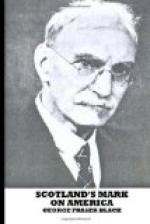and Treasurer of the province. Alexander Skene,
who previously held office in Barbadoes, settled in
North Carolina about 1696. In 1717 he was Member
of Council and Assistant to the Judge of Admiralty
to try a number of pirates. In 1719 he was elected
Member of the New House of Assembly and became leader
of the movement for the Proprietary Government.
He was “looked upon as a man that understood
public affairs very well.” Major Richard
Stobo (1727-c. 1770), a native of Glasgow, served
in the Canadian campaign against the French.
It was he who guided the Fraser Highlanders up the
Heights of Abraham. Archibald Kennedy (c. 1687-1763),
a relative of the Earl of Cassilis, was Collector
of Customs of the Port of New York and Member of the
Provincial Council. In his letters to headquarters
and in his reports he urged the importance of the American
Colonies to the mother country and advocated measures
which, if carried out, would undoubtedly have strengthened
their loyalty and added to their wealth and prosperity.
Alexander Barclay, grandson of the Apologist of the
Quakers, was Comptroller of the Customs under the Crown
in Philadelphia from 1762 till his death in 1771.
William Ronald, a native of Scotland, was a delegate
in the Virginia Convention of 1788. His brother,
General Andrew Ronald, was one of the Counsel representing
the British merchants in the so-called British Debts
Case. William Houston, son of Sir Patrick Houston,
was a Delegate to the Continental Congress (1784-87)
and a Depute from Georgia to the Convention for revising
the Federal Constitution. His portrait, as well
as that of his brother’s, was destroyed by fire
during the Civil War. Sir William Dunbar (c.
1740-1810), a pioneer of Louisiana, held important
trusts under the Federal government and was a correspondent
of Thomas Jefferson. Rev. Henry Patillo (1736-1801),
born in Scotland, advocated separation from the mother
country on every possible occasion, and was a Member
of the Provincial Council in 1775. John Dickinson
(1732-1808), Member of the Continental Congress of
1765, of the Federal Convention of 1787, and President
of Pennsylvania (1782-85), was also the founder of
Dickinson College, Carlisle, Pennsylvania. The
Dickinsons came from Dundee in early colonial times.
John Ross, purchasing agent for the Continental Army,
was born in Tain, Ross-shire. He lost about one
hundred thousand dollars by his services to his adopted
country, but managed to avoid financial shipwreck.
John Harvie, born at Gargunnock, died 1807, was Member
of the Continental Congress (1777), signer of the
Articles of Confederation the following year, and
in 1788 was appointed Secretary of the Commonwealth.
John McDonnell (1779-1846), born in Scotland, was
in business in Detroit in 1812, and “thoroughly
Americanized.” He opposed the British commander’s
orders after the surrender of Hull, and redeemed many
captives from the Indians. Became Member of State
Constitutional Convention (1835), State Senator (1835-37),




